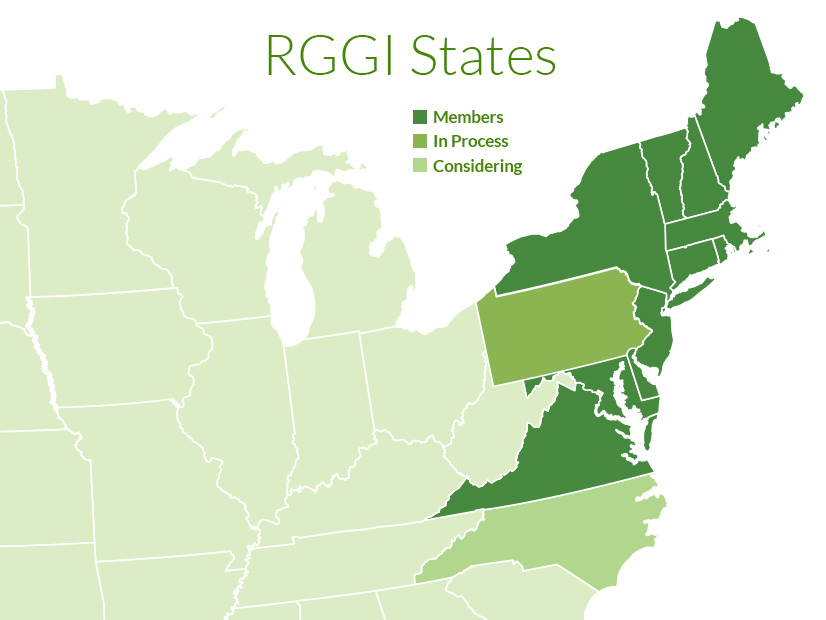North Carolina should join the Regional Greenhouse Gas Initiative (RGGI) the Air Quality Committee of the North Carolina Environmental Management Commission recommended Tuesday in a 4-1 vote. The recommendation will be passed on to the full commission for discussion at its July 13 meeting, but the Republican-controlled state legislature could seek to block the move, as GOP lawmakers have done in Pennsylvania.
The vote is an endorsement of a petition for rulemaking filed by the Southern Environmental Law Center on behalf of Clean Air Carolina and the North Carolina Coastal Federation. Joining RGGI’s carbon trading program would mean establishing a declining cap on CO2 emissions from the electric power industry.
“The threat of climate change to North Carolina is real,” Derb Carter, director of the Southern Environmental Law Center’s North Carolina offices, told the committee. He cited rising sea levels that threaten coastal areas and the increase of extreme weather, hurricanes and flooding events affecting the Tar Heel State. “We need to reach carbon neutrality by 2050,” he said.
While there was no dissent at the meeting regarding the goal of reducing carbon emissions, the petition did meet vocal skepticism from committee member Charlie Carter, as well as from an attorney who spoke on behalf of Charlotte Pipe & Foundry, a manufacturer of cast iron and plastic pipe and fittings. The latter said it would be “ill advised” for the state to join RGGI, arguing that it is not clear that the states that have joined it have reduced their carbon dioxide emissions as a result — and that if a reduction has occurred, it can’t be shown to be the result of RGGI policies. She also said the proposal could cost North Carolina ratepayers and taxpayers millions and that it is “inappropriate and potentially unlawful” for the state to join RGGI through an administrative rulemaking procedure instead of allowing the state legislature to weigh in. Charlie Carter agreed with the latter point.
But for Derb Carter, the goal is to get North Carolina to meet an electric power emission target of 23.8 million metric tons (MMT) of carbon dioxide by 2030, which would be a reduction of 70% from the 2005 level of 79.4 MMT. In 2019, before the COVID-19 pandemic lockdowns resulted in unexpected cuts in carbon pollution. The North Carolina electric power sector produced 48.4 MMT, according to a chart he displayed.
Derb Carter cited North Carolina Gov. Roy Cooper’s (D) 2018 executive order, which set a goal of reducing statewide greenhouse gas emissions to 40% below 2005 levels by 2025.
He also drew on a recent report by Duke University’s Nicholas Institute for Environmental Policy Solutions and the University of North Carolina’s Center for Climate, Energy, Environment and Economics, which argues that “RGGI policies drive some of the deepest in-state reductions by 2030, with RGGI providing the quickest reductions prior to 2030.” Additionally, the costs of RGGI, either as a change in net present value or costs per ton, “are among the lowest of the options,” according to the report.
Also speaking on behalf of the petition, Nick Jimenez, a staff attorney with the Southern Environmental Law Center, said it would reduce carbon dioxide emissions by about 10 MMT, or 28%, in the first year it would be in effect, followed by a gradual decline thereafter. He said the reduction in fossil fuel generation would also cut sulfur dioxide and nitrous oxide emissions, while residential electric bills would only go up $2 per month, an amount that could be offset by assistance programs.
The proposed North Carolina rule is mainly based on the RGGI rule, Jimenez said, but there are some differences. For example, biomass is not treated as carbon-neutral, and there is no exemption for industrial emitters.
Should the state proceed, Jimenez estimated the earliest date RGGI could go into effect would be Jan. 1, 2023.
RGGI’s current members are the six New England states, New York, New Jersey, Maryland and Virginia. New Jersey and Virginia joined following legislation approved after Democrats won control of their statehouses.
North Carolina would be attempting to join through executive branch regulations, as Pennsylvania Gov. Tom Wolf (D) is trying to accomplish. On Monday, the Pennsylvania Senate approved — by a veto-proof majority SB119 — a bill that would stop Wolf’s rulemaking.
ClearView Energy Partners said in a note to clients Tuesday that the bill is unlikely to pass the Pennsylvania House with a veto-proof majority, but that the 2022 gubernatorial election and potential litigation are “material risks to the longevity of such a regulatory effort.” Wolf is term limited.
ClearView said it expects North Carolina’s Republican legislature to take similar action to block a RGGI rulemaking.



